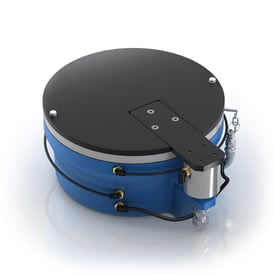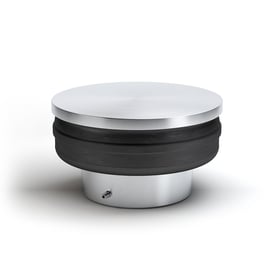Vibration issues in automotive testing equipment like dynamometers, wind tunnels, and suspension testers range from the unnoticeable to the unavoidable.
From General Motors to Mercedes, Audi, and everything in between, Fabreeka boasts countless success stories with the top automotive manufacturers. To support the demands and needs of automotive testing groups worldwide, Fabreeka provides custom low-frequency vibration isolation systems tailored to various applications.
Engine Dynamometers
Engine dynamometers are used to measure the power output of engines by evaluating torque and rotational speed. However, excessive vibration can interfere with sensor readings, leading to inaccurate measurements. Vibrations may also cause mechanical wear and tear, reducing the lifespan of the dynamometer.
Sources of Vibration: The primary sources of vibration in engine dynamometers include:
- Engine Imbalance
- Mounting Issues
- External Environmental Factors
Identifying these sources is critical to mitigate their effects on the equipment.
Identification: Regular monitoring of sensor data for inconsistencies and visual inspection of mechanical components for signs of wear can help identify vibration issues early.
READ NEXT: [ What Is Dyno Testing?]
Chassis Dynamometers
Chassis dynamometers measure the power output delivered to the wheels, simulating real-world driving conditions. Vibrations can skew the measurements by affecting the rollers and sensors, leading to erroneous data that can misinform performance assessments.
Sources of Vibration:
- Uneven roller surfaces
- Vehicle misalignment
- Drivetrain operation
Identification: Observing deviations in power output readings and conducting periodic checks for roller and vehicle alignment can help identify vibration problems.
Wind Tunnels
Wind tunnels are used to test the aerodynamics of vehicles. Vibrations can create unwanted airflow disturbances, compromising the accuracy of aerodynamic data. They can also destabilize sensitive instruments used to measure forces and moments on the vehicle model.
unwanted airflow disturbances, compromising the accuracy of aerodynamic data. They can also destabilize sensitive instruments used to measure forces and moments on the vehicle model.
Sources of Vibration: Vibrations in wind tunnels can originate from the test model, fan motors, and structural components of the tunnel itself.
Identification: Anomalies in airflow patterns and inconsistencies in aerodynamic data can signal vibration issues. Inspection of the structural integrity and monitoring of fan operation can help pinpoint sources.
Vibration Test Systems
Ironically, even vibration test systems, which are designed to simulate real-world vibrations, can suffer from cross-interference due to unintended vibrations from other machinery. This interference can lead to erroneous results and misinterpretation of data.
Sources of Vibration:
- Nearby machinery
- Structure-borne vibration
- Improper isolation
Identification: Cross-checking data from multiple tests and isolating the test system can help in identifying and separating unintended vibrations from the intended test vibrations.
Eliminate Vibration With Pneumatic Isolators and Other Solutions
These applications often have high amplitude and shock frequencies that affect the accuracy of precision measuring needed in automotive testing. However, when our low-frequency pneumatic isolators are used, the vibration and shock that would otherwise affect accurate testing are reduced significantly.
Here’s more about how our line of isolators can help you:
PAL Isolators
Fabreeka’s Precision Aire™ pneumatic isolator systems provide superior low-frequency vibration isolation using automatic leveling membrane air springs. They can be custom-designed to have vertical and horizontal natural frequencies as low as 0.4 to 0.5 Hz. However, the standard Fabreeka PAL isolators have a natural frequency as low as 1.7 Hz.
These isolators, designed to provide vibration and shock protection to equipment, support payloads ranging from 120 to 75 thousand pounds per isolator. The system contains a minimum of three master isolators and each isolator consists of a leveling valve to control load sensing and height. If necessary, to support heavier loads, any number of support isolators may be added.
READ NEXT: [ Pneumatic Isolation for External Vibration]
.png?width=250&height=250&name=SSS%20Email%20Graphic%20(1).png) In addition, our systems automatically re-level with automatic level control valves if there are sudden changes to the supported load. Moreover, each of our systems comes with a control unit, pneumatic tubing, and other pneumatic accessories necessary for complete system installation.
In addition, our systems automatically re-level with automatic level control valves if there are sudden changes to the supported load. Moreover, each of our systems comes with a control unit, pneumatic tubing, and other pneumatic accessories necessary for complete system installation.
Similar to that of the automotive testing environment, engineers at Fabreeka perform dynamic and structural analyses to simulate the isolation system’s response.
RLA Isolators

RLA isolators provide low-frequency isolation in the vertical and horizontal directions. Depending on the design, natural frequencies from 0.6 Hz may be achieved, and loads from 7,700 to 69,300 pounds can be supported by each isolator.
The Rolling Lobe Air Isolators, also known as airbag isolators, consist of at least three springs for three-point level control. Like the Pal Isolator, each RLA has an integrated level control valve that functions as a load/position sensor. In addition, the system comes with a control panel, automatic height control valves, pneumatic tubing, and expertise from the engineers at Fabreeka.
Fabreeka And The Automotive Industry
In conclusion, vibration issues in automotive testing equipment can have a significant impact on the accuracy and reliability of data obtained from dynamometers, wind tunnels, and suspension testers. By utilizing custom low-frequency vibration isolation systems from Fabreeka, automotive testing groups can mitigate these issues and ensure precise measurements and assessments.
The PAL and RLA isolators offer superior vibration and shock protection, allowing for accurate testing results. To learn more about how Fabreeka's isolators can benefit your automotive testing operations, reach out to our team for expert guidance and solutions. Engage further with Fabreeka to optimize your testing equipment and enhance performance in the automotive industry.



.png?width=2240&height=1260&name=Production%20Campaign%20(Blog%20Banner).png)
SUBMIT YOUR COMMENT